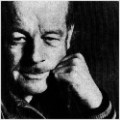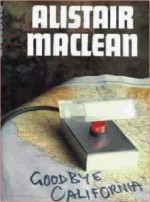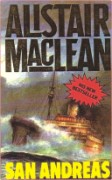| Author Profile
Alistair MacLean
Compiled by Mahdin Mahboob
 Alistair Maclean, author of twenty-nine world bestsellers and recognised as an outstanding writer in his own genre was born on 28th April, 1922 in Glasgow, Scotland. Best known for his 'The Guns of Navarone' and 'Where Eagles Dare', this famous author was also known by his pseudonym Ian Stuart. Alistair Maclean, author of twenty-nine world bestsellers and recognised as an outstanding writer in his own genre was born on 28th April, 1922 in Glasgow, Scotland. Best known for his 'The Guns of Navarone' and 'Where Eagles Dare', this famous author was also known by his pseudonym Ian Stuart.
MacLean derived much of his ideas about sea warfare from his experience at the British Royal Navy, where he joined in 1941 and saw hands on action during the World War II. During this war, he played important roles in different missions all across the world, ranging from the Norwegian coast and Aegean Sea to the Far Eastern countries of Burma, Malaysia, Indonesia and Singapore.
After getting released from the Navy in 1946, MacLean studied English in the University of Glasgow where he graduated in 1953. Later in his life, this University awarded him with a Doctorate of Literature for his contributions to English literature.
 His first novel HMS Ulysses, based on his own war experiences, was a great success and allowed MacLean to be able to devote himself entirely to writing war stories, spy stories and other adventures. His first novel HMS Ulysses, based on his own war experiences, was a great success and allowed MacLean to be able to devote himself entirely to writing war stories, spy stories and other adventures.
In the early 1960s, MacLean published two novels under the pseudonym "Ian Stuart" in order to prove that the popularity of his books was due to their content rather than his name on the cover. They sold well, but MacLean made no attempt to change his writing style and his fans may easily have recognized him behind the Scottish pseudonym. MacLean's books eventually sold so well that he moved to Switzerland as a tax exile. From 19631966, he took a hiatus from writing to run a hotel business in England.
Compared to other thriller writers of the time, such as Ian Fleming, MacLean's books are exceptional in one way at least: they are always short on romance because MacLean thought that such diversions merely serve to slow down the action. Nor do the MacLean books resemble the more recent techno-thriller approach. Instead, he lets little hinder the flow of events in his books, making his heroes fight against seemingly unbeatable odds and often pushing them to the limits of their physical and mental endurance. MacLean's heroes are usually calm, cynical men entirely devoted to their work and often carrying some kind of secret knowledge. A characteristic twist is that one of the hero's closest co-operators turns out a traitor.
 Nature, especially the sea and the arctic north, plays an important part in MacLean's stories, and he used a variety of exotic parts of the world as settings to his books. Only one of them, When Eight Bells Toll, is set in his native Scotland. MacLean's best books are often those in which he was able to make use of his own direct knowledge of warfare and sea fare such as HMS Ulysses which is now considered a classic of naval fiction. Nature, especially the sea and the arctic north, plays an important part in MacLean's stories, and he used a variety of exotic parts of the world as settings to his books. Only one of them, When Eight Bells Toll, is set in his native Scotland. MacLean's best books are often those in which he was able to make use of his own direct knowledge of warfare and sea fare such as HMS Ulysses which is now considered a classic of naval fiction.
Many of MacLean's novels were made into films, but none completely captured the level of detail and the intensity of his writing style as exemplified in classics such as Fear is the Key; the two most artistically and commercially successful film adaptations were The Guns of Navarone and Where Eagles Dare.
MacLean's later books were not as well received as the earlier ones and, in an attempt to keep his stories in keeping with the time, he sometimes lapsed into overly improbable plots. He also struggled constantly with alcoholism, which eventually brought about his death in Munich in 1987.
Copyright
(R) thedailystar.net 2007 |
